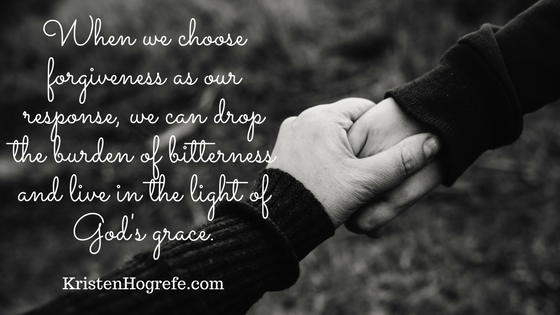Why the Resurrection Makes Forgiveness Possible
 Have you ever struggled to forgive someone? Though we know intellectually that we should forgive because God forgave us, we sometime struggle emotionally to let go of hurts that others have done us. But she wronged me. You don’t know what he did to me.
Have you ever struggled to forgive someone? Though we know intellectually that we should forgive because God forgave us, we sometime struggle emotionally to let go of hurts that others have done us. But she wronged me. You don’t know what he did to me.
I’m not excusing others’ behaviors and actions. More than likely, we all have felt some form of injustice. Perhaps we have knowingly or unknowingly injured someone as well.
But the point is not what people do to us but how we respond to them. We can’t control their actions, but we can control our response to it. When Steven R. Covey tells the story of Holocaust survivor Viktor E. Frankle, he explains this man’s discovery while undergoing unspeakable mistreatment in a concentration camp.
In the space between stimulus (what happens) and how we respond, lies our freedom to choose.
Frankle found that although he could not control what happened to him, he still controlled how he responded to it. Even though he was a prisoner, he discovered freedom that his tormentors could not take away from him.
Yes, freedom. Most of us will probably never experience a concentration camp like Frankle or a satellite prison like my heroine Portia in The Revolutionary. But we will find ourselves in hard situations where others wrong us. When we choose forgiveness as our response, we can drop the burden of bitterness and live in the light of God’s grace.
The cross and empty tomb
The cross and the empty tomb represent forgiveness at its ultimate triumph.
In the cross, we see Christ’s sacrifice for us and the unimaginable sin debt He forgave by willingly giving Himself to die for us. Not only did He die for us, but Jesus also experienced the excruciating pain of isolation from His Father. He took on the full wrath of God so that we wouldn’t have to.
Even though we didn’t deserve God’s forgiveness, He made possible a way for us to find it (John 3:16). Shouldn’t we then extend generosity to others who perhaps do not “deserve it”? I like how Paul explains this challenge in Ephesians 4:32: “Be kind to one another, tenderhearted, forgiving one another, as God in Christ forgave you” (ESV).
In the empty tomb, we see His complete conquest and victory over death. I Corinthians 15:56-57 reminds us that the believer can know freedom from earthy constraints because of the resurrection. “The sting of death is sin, and the strength of sin is the law. But thanks be to God, who gives us the victory through our Lord Jesus Christ” (NKJV).
I think that victory extends to all aspects of our Christian lives, including the challenge of forgiveness. We can live victoriously when we let go of pain and hurt and truly forgive.
Forgiveness made possible
In the words of C.S. Lewis, the resurrection makes forgiveness possible for this basic reason:
To be a Christian means to forgive the inexcusable, because God has forgiven the inexcusable in you.
That’s the bottom line. What others have done may indeed be inexcusable, but we can forgive because God first forgave us.
Easter or Resurrection Sunday is a few short days away. Don’t carry unnecessary bitterness with you into this time of remembrance and celebration. Drop those weights at the foot of the cross and bask in the power of forgiveness, modeled perfectly for us through Jesus Christ.
~ Kristen
Tweetable
Why the Resurrection makes forgiveness possible – @kjhogrefe (Click to Tweet)



